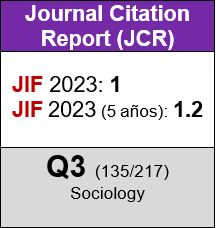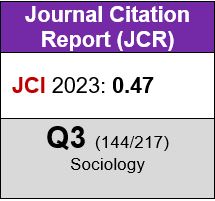La influencia de la eficacia política y la identidad partidista sobre la participación electoral en España: los vínculos de la ciudadanía con el funcionamiento del sistema político
DOI:
https://doi.org/10.5477/cis/reis.185.3-22Palabras clave:
Democracia, Eficacia política, Identificación partidista, Participación electoralResumen
La producción investigadora presenta de manera multidireccional el orden explicativo que en el sistema político tienen variables como la identificación política, la eficacia política y la participación electoral, y la influencia sobre estas de variables segmentadoras como edad, sexo, ingresos, nivel educativo, clase social o religiosidad. Este trabajo analiza las relaciones estructurales entre los perfiles sociodemográficos y la participación electoral, tamizadas en la investigación a través del impacto que puede ejercer la eficacia política y la identidad partidista. Utilizando modelos estructurales sobre datos del Estudio CIS 3226, los resultados muestran la centralidad de la identificación política para explicar la percepción de la eficacia política y el comportamiento electoral, el efecto de la eficacia política en dicha participación electoral y la influencia dispar de diferentes variables de segmentación clásicas.
Descargas
Citas
Abramowitz, Alan I. y Saunders, Kyle (2006). «Exploring the Bases of Partisanship in the American Electorate: Social Identity vs. Ideology». Political Research Quarterly, 59(2): 175-187. DOI: https://doi.org/10.1177/106591290605900201
Aguilar, Paloma y Sánchez-Cuenca, Ignacio (2007). «¿Gestión o representación? Los determinantes del voto en contextos políticos complejos». Revista Española de Investigaciones Sociológicas, 117: 61-86. doi: 10.2307/40184753 DOI: https://doi.org/10.2307/40184753
Alaminos, Antonio (2021). «Las dinámicas de cambio en el comportamiento del electorado en España». Revista Sistema, 260: 17-34.
Alaminos, Antonio; Francés, Francisco; Penalva-Verdú, Clemente y Santacreu, Oscar (2015). Introducción a los modelos estructurales en investigación social. Cuenca (Ec): Pydlos.
Ančić, Branko; Baketa, Nikola y Kovačić, Marko (2019). «Exploration of Class and Political Behavior in Croatia». International Journal of Sociology, 49(4): 264-281. doi:10.1080/00207659.2019.1634826 DOI: https://doi.org/10.1080/00207659.2019.1634826
Arens, A. Katrin y Watermann, Rainer (2017). «Political Efficacy in Adolescence. Development, Gender Differences, and Outcome Relations». Developmental psychology, 53: 933-948. doi: 10.1037/dev0000300 DOI: https://doi.org/10.1037/dev0000300
Balch, George (1974). «The Concept “Sense of Political Efficacy”». Political Methodology, 1(2): 1-43.
Bartels, Larry M. (2002). «Beyond the Running Tally: Partisan Bias in Political Perceptions». Political Behavior, 24(2): 117-150. doi: 10.1023/A:1021226224601 DOI: https://doi.org/10.1023/A:1021226224601
Bartels, Larry M. y Jackman, Simon (2014). «A Generational Model of Political Learning». Electoral Studies, 33: 7-18. doi: 10.1016/j.electstud.2013.06.004 DOI: https://doi.org/10.1016/j.electstud.2013.06.004
Borgonovi, Francesca y Pokropek, Artur (2017). «Mind that Gap: The Mediating Role of Intelligence and Individuals' Socio-economic Status in Explaining Disparities in External Political Efficacy in 28 Countries». Intelligence, 62: 125-137. doi: 10.1016/j.intell.2017.03.006 DOI: https://doi.org/10.1016/j.intell.2017.03.006
Bühlmann, Marc y Freitag, Markus (2006). «Individual and Contextual Determinants of Electoral Participation». Swiss Political Science Review, 12(4): 13-47. doi: 10.1002/j.1662-6370.2006.tb00059.x DOI: https://doi.org/10.1002/j.1662-6370.2006.tb00059.x
Calle, Luis de la; Martínez, Alvaro y Orriols, Lluis (2010). «Voting without Ideology. Evidence from Spain (1979-2008)». Revista Española de Investigaciones Sociológicas, 129: 107-129. DOI: https://doi.org/10.5477/cis/reis.129.107
Castillo, Pilar del (1990). «Aproximación al estudio de la identificación partidista en España». Revista de Estudios Políticos, 70: 125-141.
Cazorla, Angel; Rivera, Jose y Jaráiz, Erika (2017). «La abstención electoral en las elecciones al Parlamento Europeo de 2014: análisis estructural de sus componentes». Revista Española de Investigaciones Sociológicas, 159: 31-50. doi: 10.5477/cis/reis.159.31 DOI: https://doi.org/10.5477/cis/reis.159.31
Chen, Phillip y Goren, Paul (2016). «Operational Ideology and Party Identification: A Dynamic Model of Individual-Level Change in Partisan and Ideological Predispositions». Political Research Quarterly, 69(4): 703-715. doi: 10.1177/1065912916658551 DOI: https://doi.org/10.1177/1065912916658551
Cohen, Aaron; Vigoda, Eran y Samorly, Aliza (2001). «Analysis of the Mediating Effect of Personal-Psychological Variables on the Relationship Between Socioeconomic Status and Political Participation: A Structural Equations Framework». Political Psychology, 22(4): 727-757. doi: 10.1111/0162-895X.00260 DOI: https://doi.org/10.1111/0162-895X.00260
Dalton, Russell (2002). «The Decline of Party Identifications». En: R. Dalton y M. Wattenberg (eds.). Parties without Partisans. Political Change in Advanced Industrial Democracies. Oxford-NY: Oxford University Press. DOI: https://doi.org/10.1093/0199253099.003.0002
Dassonneville, Ruth; Hooghe, Marc y Vanhoutte, Bram (2012). «Age, Period and Cohort Effects in the Decline of Party Identification in Germany: An Analysis of a Two Decade Panel Study in Germany (1992–2009)». German Politics, 21(2): 209-227. doi: 10.1080/09644008.2012.679659 DOI: https://doi.org/10.1080/09644008.2012.679659
Davis, Nicholas y Hitt, Matthew (2017). «Winning, Losing, and the Dynamics of External Political Efficacy». International Journal of Public Opinion Research, 29(4): 676-689. doi: 10.1086/267373 DOI: https://doi.org/10.1086/267373
Delgado, Irene (2019). «La competencia partidista en las elecciones generales de 2015: factores contextuales y anclajes ideológicos». Tendencias Sociales. Revista de Sociología, 3: 158-187. DOI: https://doi.org/10.5944/ts.3.2019.23595
Devine, Christopher (2012). «Social Issues, Authoritarianism, and Ideological Conceptualization: How Policy Dimensions and Psychological Factors Influence Ideological Labeling». Political Psychology, 33(4): 531-552. doi: 10.1111/j.1467-9221.2012.00888.x DOI: https://doi.org/10.1111/j.1467-9221.2012.00888.x
Devine, Christopher (2015). «Ideological Social Identity: Psychological Attachment to Ideological In-Groups as a Political Phenomenon and a Behavioral Influence». Political Behavior, 37(3): 509-535. doi: 10.1007/s11109-014-9280-6 DOI: https://doi.org/10.1007/s11109-014-9280-6
Dinas, Elias (2014). «Does Choice Bring Loyalty? Electoral Participation and the Development of Party Identification». American Journal of Political Science, 58(2): 449-465. doi: 10.1111/ajps.12044 DOI: https://doi.org/10.1111/ajps.12044
Driskell, Robyn; Embry, Elizabeth y Lyon, Larry (2008). «The Influence of Religious Beliefs on Political Participation». Social Science Quarterly, 89(2): 294-314. doi: 10.1111/j.1540-6237.2008.00533.x DOI: https://doi.org/10.1111/j.1540-6237.2008.00533.x
Finifter, Ada (1970). «Dimensions of Political Alienation». The American Political Science Review, 62(4): 389-410. doi: 10.2307/1953840 DOI: https://doi.org/10.2307/1953840
Finkel, Steven (1985). «Reciprocal Effects of Participation and Political Efficacy: A Panel Analysis». American Journal of Political Science, 29(4): 8981-913. doi: 10.2307/2111186 DOI: https://doi.org/10.2307/2111186
Font, Joan y Blanco, Ismael (2005). «¿Qué hay detrás de la oferta de participación? El rol de los factores instrumentales e ideológicos en los mecanismos españoles de participación». Revista del CLAD Reforma y Democracia, 31: 1-17.
Fraile, Marta (2007). «La influencia del conocimiento político en las decisiones de voto». Revista Española de Investigaciones Sociológicas, 120: 41-74. doi: 10.2307/40184833 DOI: https://doi.org/10.2307/40184833
Francés, Francisco; Alaminos-Fernández, Antonio F.; Santacreu, Oscar y Alaminos, Antonio (2022). «Sistematización conceptual de las mediciones de ajuste ideológico entre la oferta de representación política y la demanda ciudadana». Obets. Revista de Ciencias Sociales, 17(1): 81-100. doi:10.14198/OBETS2022.17.1.05 DOI: https://doi.org/10.14198/OBETS2022.17.1.05
Goren, Paul (2005). «Party Identification and Core Political Values». American Journal of Political Science, 49(4): 881-896. doi: 10.1111/j.1540-5907.2005.00161.x DOI: https://doi.org/10.1111/j.1540-5907.2005.00161.x
Greene, Steven (1999). «Understanding Party Identification: A Social Identity Approach». Political Psychology, 20(2): 393-403. doi: 10.1111/0162-895X.00150 DOI: https://doi.org/10.1111/0162-895X.00150
Greene, Steven (2004). «Social Identity Theory and Party Identification». Social Science Quaterly, 85(1): 136-153. doi: 10.1111/j.0038-4941.2004.08501010.x DOI: https://doi.org/10.1111/j.0038-4941.2004.08501010.x
Gulevich, Olga; Sarieva, Irena; Nevruev, Andrey y Yagiyayev, Illya (2017). «How Do Social Beliefs Affect Political Action Motivation? The Cases of Russia and Ukraine». Group Processes & Intergroup Relations, 20(3): 382-395. doi: 10.1177/1368430216683531 DOI: https://doi.org/10.1177/1368430216683531
Hanson, Russell (1980). «Political Culture, Interparty Competition and Political Efficacy in the American States». Publius, 10(2): 17-36. doi: 10.2307/3329721 DOI: https://doi.org/10.2307/3329721
Ikeda, Kenichi; Kobayashi, Tetsuro y Hoshimoto, Maasa (2008). «Does Political Participation Make a Difference? The Relationship between Political Choice, Civic Engagement and Political Efficacy». Electoral Studies, 27: 77-88. doi: 10.1016/j.electstud.2007.11.004 DOI: https://doi.org/10.1016/j.electstud.2007.11.004
Jack, Nagel y McNulty, John (1996). «Partisan Effects of Voter Turnout in Senatorial and Gubernatorial Election». The American Political Science Review, 90(4): 780-793. doi: 10.2307/2945842 DOI: https://doi.org/10.2307/2945842
Justel, Manuel (1990). «Panorámica de la abstención electoral en España». Revista de Estudios Políticos, 62: 343-396.
Justel, Manuel (1995). La abstención electoral en España, 1977-1993. Madrid: CIS.
Karp, Jeffrey (2012). «Electoral Systems, Party Mobilisation and Political Engagement». Australian Journal of Political Science, 47(1): 71-89. doi: 10.1080/10361146.2011.643165 DOI: https://doi.org/10.1080/10361146.2011.643165
Karp, Jeffrey y Banducci, Susan (2008). «Political Efficacy and Participation in Twenty-Seven Democracies: How Electoral Systems Shape Political Behaviour». British Journal of Political Science, 38: 311-334. doi: 10.1017/S0007123408000161 DOI: https://doi.org/10.1017/S0007123408000161
Kenski, Kate y Stroud, Jomini (2006). «Connections between Internet Use and Political Efficacy, Knowledge, and Participation». Journal of Broadcasting & Electronic Media, 50(2): 173-192. doi: 10.1207/s15506878jobem5002_1 DOI: https://doi.org/10.1207/s15506878jobem5002_1
Laurison, Daniel (2016). «Social Class and Political Engagement in the United States». Sociology Compass, 10(8): 684-697. doi: 10.1111/soc4.12390 DOI: https://doi.org/10.1111/soc4.12390
Lijphart, Arend (1997). «Unequal Participation: Democracy's Unresolved Dilemma». The American Political Science Review, 91(1): 1-14. doi: 10.2307/2952255 DOI: https://doi.org/10.2307/2952255
Lupu, Noam (2013). «Party Brands and Partisanship: Theory with Evidence from a Survey Experiment in Argentina». American Journal of Political Science, 57: 49-64. doi: 10.1111/j.1540-5907.2012.00615.x DOI: https://doi.org/10.1111/j.1540-5907.2012.00615.x
Magni, Gabriele (2017). «It's the Emotions, Stupid! Anger about the Economic Crisis, Low Political Efficacy, and Support for Populist Parties». Electoral Studies, 50: 91-102. doi: 10.1016/j.electstud.2017.09.014 DOI: https://doi.org/10.1016/j.electstud.2017.09.014
Marshall, Janine; Thomas, Melanee y Gidengil, Elisabeth (2007). «The Efficacy Enigma: Explaining the Gender Gap in Internal Political Efficacy in Canada and the United States». Paper prepared for presentation at the Annual Meeting of the Canadian Political Science Association. Saskatoon.
Mason, Lilliana (2018). «Ideologues without Issues. The Polarizing Consequences of Ideological Identities». Public Opinion Quarterly, 82: 866-887. doi: 10.1093/poq/nfy005 DOI: https://doi.org/10.1093/poq/nfy005
McClendon, Gwyneth y Riedl, Rachel (2015). «Religion as a Stimulant of Political Participation: Experimental Evidence from Nairobi, Kenya». The Journal of Politics, 77(4): 1045-1057. doi: 10.1086/682717 DOI: https://doi.org/10.1086/682717
Montero, José; Font, Joan y Torcal, Mariano (eds.). (2006). Ciudadanos, asociaciones y participación en España. Madris: CIS.
Niemi, Richard; Craig, Stephen y Mattei, Franco (1991). «Measuring Internal Political Efficacy in the 1988 National Election Study». American Political Science Review, 81(4): 1407-1413. doi: 10.2307/1963953 DOI: https://doi.org/10.2307/1963953
Ortega, Carmen y Montabes, Juan (2011). «Identificación partidista y voto: las elecciones autonómicas en Andalucía (2004-2008)». Revista Española de Investigaciones Sociológicas, 134: 27-54. doi: 10.5477/cis/reis.134.27 DOI: https://doi.org/10.5477/cis/reis.134.27
Otero, Patricia (2014). «Vínculos entre partidos y votantes. Ideología e integración europea en perspectiva comparada». Revista Española de Investigaciones Sociológicas, 136: 141-170.
Paramio, Ludolfo (2000). «Clase y voto: intereses, identidades y preferencias». Revista Española de Investigaciones Sociológicas, 90: 79-93. doi: 10.2307/40184252 DOI: https://doi.org/10.2307/40184252
Paulsen, Ronelle (1991). «Education, Social Class, and Participation in Collective Action». Sociology of Education, 64(2): 96-110. doi: 10.2307/2112881 DOI: https://doi.org/10.2307/2112881
Pollock, Philip (1983). «The Participatory Consequences of Internal and External Political Efficacy: A Research Note». Western Political Quarterly, 36(3): 400-409. doi: 10.1177/106591298303600306 DOI: https://doi.org/10.1177/106591298303600306
Rasmussen, Stig y Nørgaard, Asbjorn (2018). «When and Why Does Education Matter? Motivation and Resource Effects in Political Efficacy». European Journal of Political Research, 57(1): 24-46. doi: 10.1111/1475-6765.12213 DOI: https://doi.org/10.1111/1475-6765.12213
Recuero, Fatima (2015). «¿Siguen vigentes los modelos explicativos del comportamiento electoral en España?». Opción, 31: 1063-1085.
Reichert, Frank (2018). «How Important Are Political Interest and Internal Political Efficacy in the Prediction of Political Participation? Longitudinal Evidence from Germany». Revista de Psicología Social, 33(3): 459-503. doi: 10.1080/02134748.2018.1482056 DOI: https://doi.org/10.1080/02134748.2018.1482056
Sáez, José (2002). «La decisión del elector: partidismo, racionalidad-economía y estructura social». Revista Española de Investigaciones Sociológicas, 98: 139-170. doi: 10.2307/40184442 DOI: https://doi.org/10.2307/40184442
Sears, David y Funk, Carolyn (1999). «Evidence of the Long-Term Persistence of Adults' Political Predispositions». The Journal of Politics, 61(1): 1-28. doi: 10.2307/2647773 DOI: https://doi.org/10.2307/2647773
Settle, Jaime; Bond, Robert y Levitt, Justin (2011). «The Social Origins of Adult Political Behavior». American Politics Research, 39(2): 239-263. doi: 10.1177/1532673X10382195 DOI: https://doi.org/10.1177/1532673X10382195
Stoker, Laura y Jennings, M. Kent (2008). «Of Time and the Development of Partisan Polarization». American Journal of Political Science, 52(3): 619-635. doi: 10.1111/j.1540-5907.2008.00333.x DOI: https://doi.org/10.1111/j.1540-5907.2008.00333.x
Stroud, Natalie (2010). «Polarization and Partisan Selective Exposure». Journal of Communication, 60: 556-576. doi: 10.1111/j.1460-2466.2010.01497.x DOI: https://doi.org/10.1111/j.1460-2466.2010.01497.x
Sulitzeanu-Kenan, Raanan y Halperin, Eran (2013). «Making a Difference: Political Efficacy and Policy Preference Construction». British Journal of Political Science, 43(2): 295-322. doi: 10.1017/S0007123412000324 DOI: https://doi.org/10.1017/S0007123412000324
Tambe, Elvis (2017). «Electoral Participation in African Democracies: The Impact of Individual and Contextual Factors». Commonwealth & Comparative Politics, 55(2): 119-140. doi: 10.1080/14662043.2017.1274868 DOI: https://doi.org/10.1080/14662043.2017.1274868
Uslaner, Eric (1989). «Party Identifiers in Canada: Participation and Affect». The Journal of Politic, 51(4): 993-1003. doi: 10.2307/2131545 DOI: https://doi.org/10.2307/2131545
Wen, Nainan; Hao, Xiaoming y George, Cherian (2013). «Gender and Political Participation: News Consumption, Political Efficacy and Interpersonal Communication». Asian Journal for Women’s Studies, 19(4): 124‐149. doi: 10.1080/12259276.2013.11666168 DOI: https://doi.org/10.1080/12259276.2013.11666168
Wolak, Jennifer (2018). «Feelings of Political Efficacy in the Fifty States». Political Behavior, 40(3): 763-784. doi: 10.1007/s11109-017-9421-9 DOI: https://doi.org/10.1007/s11109-017-9421-9
Zumarraga, Marcos (2020). «Aportes metodológicos para la medición del sentido de eficacia politica: Evidencia empírica de Quito-Ecuador». EMPIRIA. Revista de Metodología de Ciencias Sociales, 45: 113-142. doi: 10.5944/empiria.45.2020.26306 DOI: https://doi.org/10.5944/empiria.45.2020.26306
Descargas
Publicado
Cómo citar
Número
Sección
Licencia
Derechos de autor 2023 Revista Española de Investigaciones Sociológicas

Esta obra está bajo una licencia internacional Creative Commons Atribución-CompartirIgual 4.0.
Permite Compartir — copiar y redistribuir el material en cualquier medio o formato, Adaptar — remezclar, transformar y construir a partir del material para cualquier propósito, incluso comercialmente.








